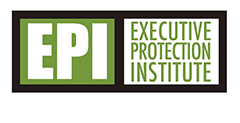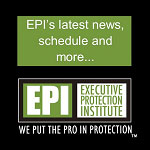When I first received the invite from Executive Protection Institute (EPI), I must admit… I was very excited, absolutely honored and a little bit worried. I was excited because I’d only heard of these guys out there in the executive protection game as one of the two top schools in the industry. Based on all the conversations I had been part of up to this point Executive Protection Institute (EPI) and Executive Security International (ESI) were referred to as the Harvard and Yale of the executive protection training cadres. Unfortunately however I have had some negative experiences with training like many other agents and I was worried that maybe this world-renowned and much respected school had fallen into tradition or even dogma to the point that it’s relevancy may have faded over the years. My primary mode of learning when it comes to the executive protection industry had simply been on the job training for the most part. I got my first security detail right out of the Marine Corps at age 21 and didn’t go to my first school until I had already successfully conducted executive protection operations in over 60 countries and seven years later. Much of what I heard was being taught in classes and things I’d seen were not necessarily relevant to what I was seeing in the private security industry. Many things were very State Department centric rather than being private security centric with regards to techniques, tactics and the amount of agents present in the drills for moving principles. If in fact my experience at EPI was not positive then I simply wouldn’t say anything about the school either way publicly. However Executive Protection Institute far exceeded my expectations and opened my eyes to many things I had not yet seen in our beloved game of executive protection.
I cannot express the amount of appreciation and respect I have for the teaching cadre at the school. They all did such a fantastic job. They all came a crossed as very professional, very thoughtful, inspirational and genuine. You could tell that they deliberately created an environment that would foster learning. Everyone was held in high regard, well-respected and encouraged to ask questions. This deliberate positive environment made it possible for us to more easily digest, comprehend and retain the very intense and extremely high volume of information they presented to us daily. A day at this course started promptly at 8 AM and continued beyond 12 AM into one or two in the morning. As a military guy I was expecting them to bring out the stress monster just for kicks but they never did and I relax because I realized it wasn’t their way of teaching… I think it really truly helped me learn better.
They trained us on virtually every component and sub component imaginable on and around the subject of executive protection. Topics such as emotional intelligence, financial management, health and mindset were not overlooked. There were courses around both hard skills and soft skills during this 100 hour journey. The volume of information was so intense and the time we spent so high-quality but rigorous that it honestly felt like I had just done a detail with these guys on the road by the time the course was over. You get close to people you work next to and I must admit this felt like a little family by the time it was our turn to leave the classroom and go back out into the world.
This course didn’t only teach techniques and tactics for executive protection but also gave you an extremely accurate understanding of what it’s like to be on the job as an executive protection agent. This is one of the primary reasons I would recommend this course to anyone getting into the game. Many courses you go to may teach you the right techniques and tactics but you will leave there was no concept of what it’s really like to do the work. I had a hard time not saying amen to so many of the statement’s instructors made about how the real world works because the content was so relevant to how things are on the job. Because you get to learn from such an assortment of different instructors who are all operating at the top of their respective game either in the government or private security industry. There’s something for everyone to learn from this school no matter where you are in your private security career.
Beyond all of this you will become an alumni of the “Nine Lives Associates” if you graduate. The Nine Lives Association (NLA) is a special brotherhood of alumni who are committed to delivering a special kind of professional service. This membership and brotherhood widens the agents sphere of relationships and thus their opportunities also multiply as a result. There are NLA members also known as “cats” in many very high places all throughout the private security industry so it is an absolute honor and to be considered a very prestigious achievement to join our ranks upon graduation.
It has been a very long time since I had experience this feeling of family after training with anyone or any group and it was a beautiful thing to experience on graduation day at EPI. I came out of this course not only feeling in my heart but knowing in my mind that I am definitely going to perform at a higher level as a private security agent moving forward as a result of my time at this learning from this fine institution.
Special thanks to Mr. Jerry Heying for being such a fantastic industry leader and the many contributions he has made to the private security industry as a whole and future generations to come.




